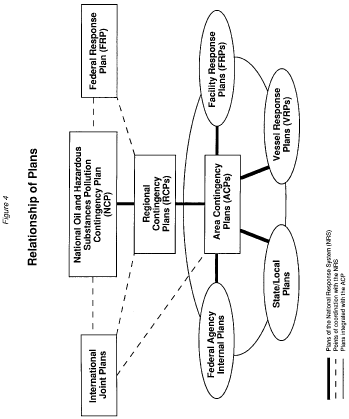...
(a) National. As described in §300.110, the NRT is responsible for national planning and coordination.
(b) Regional. As described in §300.115, the RRTs are responsible for regional planning and coordination.
(c) Area. As required by section 311(j) of the CWA, under the direction of the federal OSC for its area, Area Committees comprising qualified personnel of federal, state, and local agencies shall be responsible for:
(1) Preparing an ACP for their areas (as described in §300.210(c));
(2) Working with appropriate federal, state, and local officials to enhance the contingency planning of those officials and to assure pre-planning of joint response efforts, including appropriate procedures for mechanical recovery, dispersal, shoreline cleanup, protection of sensitive environmental areas, and protection, rescue, and rehabilitation of fisheries and wildlife; and
(3) Working with appropriate federal, state, and local officials to expedite decisions for the use of dispersants and other mitigating substances and devices.
(d) State. As provided by sections 301 and 303 of Title III, the SERC of each state, appointed by the Governor, is to designate emergency planning districts, appoint Local Emergency Planning Committees (LEPCs), supervise and coordinate their activities, and review local emergency response plans, which are described in §300.215. The SERC also is to establish procedures for receiving and processing requests from the public for information generated by Title III reporting requirements and to designate an official to serve as coordinator for information.
(e) Local. As provided by sections 301 and 303 of Title III, emergency planning districts are designated by the SERC in order to facilitate the preparation and implementation of emergency plans. Each LEPC is to prepare a local emergency response plan for the emergency planning district and establish procedures for receiving and processing requests from the public for information generated by Title III reporting requirements. The LEPC is to appoint a chair and establish rules for the LEPC. The LEPC is to designate an official to serve as coordinator for information and designate in its plan a community emergency coordinator.
(f) As required by section 311(j)(5) of the CWA, a tank vessel, as defined under section 2101 of title 46, U.S. Code, an offshore facility, and an onshore facility that, because of its location, could reasonably be expected to cause substantial harm to the environment by discharging into or on the navigable waters, adjoining shorelines, or exclusive economic zone must prepare and submit a plan for responding, to the maximum extent practicable, to a worst case discharge, and to a substantial threat of such a discharge, of oil or a hazardous substance.
(g) The relationship of these plans is described in Figure 4.

